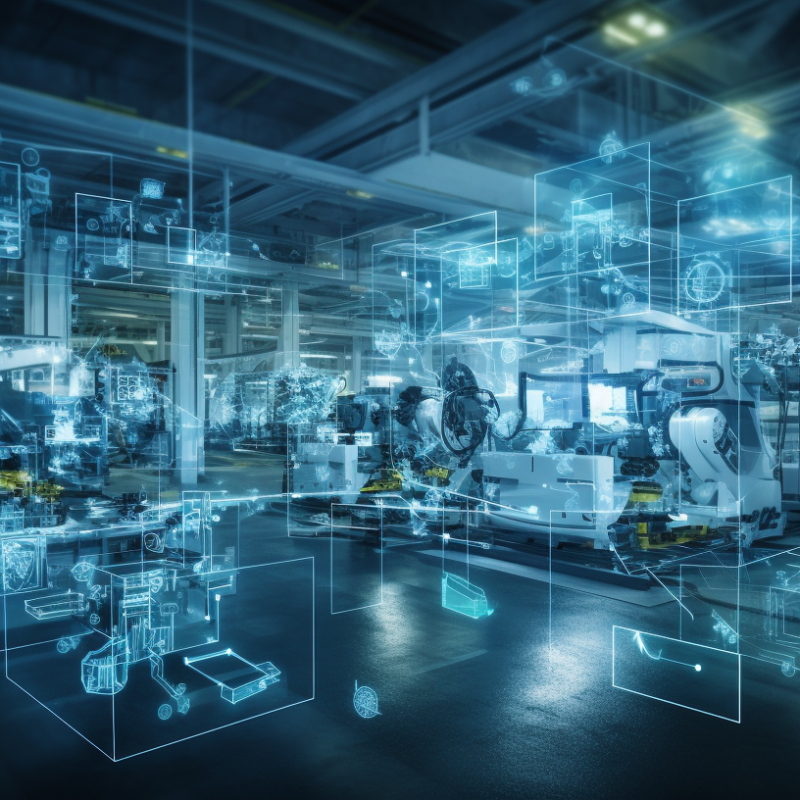Artificial Intelligence:
How AI simplifies our lives
Artificial Intelligence, or AI for short, is considered one of the most forward-looking technologies of our time. AI already has and will have an even greater impact on businesses in the future. But what exactly is AI and how does it change our lives?
What is artificial intelligence?
At its core, AI is the ability of machines to mimic human behavior and thought. AI systems can perceive their environment and make decisions and solve problems based on that.
They learn from experience and adapt their actions autonomously. In this context, AI systems are able to recognize complex interrelationships and make decisions in real time.
What opportunities does AI open up?
The capabilities of AI extend to, among other things:
- the development of new products and services and the improvement of existing ones.
- the creation of innovative business models
- Increasing the efficiency of processes and at the same time reducing costs through optimization tools
- the reduction of resource consumption and thus of environmental pollution
- the avoidance of errors in everyday work.
With various AI tools, employees can be freed up in different areas and spend more time and energy on more important projects. Looking at the market situation, AI can give other market players and competitors a competitive advantage.
Activities that can be replaced by AI
Artificial intelligence will have a major impact on how processes are executed in organizations. There are four main areas where various AI applications can help companies increase efficiency:
1. process automation
Process automation refers to the use of technology and software to streamline and optimize repetitive tasks and workflows in an organization.
Manual and time-consuming processes are automated by replacing them with automated systems that can perform the tasks with minimal human intervention.
The goal of process automation is to improve efficiency, accuracy, productivity and cost effectiveness while reducing errors, delays and reliance on manual labor.
JP Morgan is already using process automation and improved data quality to save 10 to 20 hours of work time per week for about 200 users.
2. data processing
Data processing refers to the manipulation and transformation of raw data into meaningful and useful information.
It includes various steps and techniques for organizing, analyzing, and interpreting data to gain valuable insights.
Data processing using automated tools and software can identify patterns and correlations to recommend actions and make informed decisions .
Dominos Pizza is using this technology to create faster and better demand forecasts, which means better prediction of demand for their products.
3. text capture and generation:
AI improves text capture and generation by increasing accuracy, speed, language understanding, context awareness, personalization, and the ability to continuously learn and adapt.
These advances have a wide range of applications, from automating data entry and translation tasks to supporting content creation and personalized communications.
Microsoft’s Bing in collaboration with Open AI’s ChatGPT is the best known example here. With ChatGPT Code Interpreter the powerful tool has reached another level.
4. image and video creation:
AI improves image and video generation through various techniques such as image and video synthesis, super-resolution, style transfer, and video prediction.
AI models can produce realistic images, improve image quality, and transfer artistic styles, among other things.
Zalando is one of the most prominent users of this technology and hopes to save costs on photo production. However, AI also enables the creation of deepfakes, raises concerns about misinformation, and allows the creation and manipulation of objects in images and videos.
With significant improvements in these key areas, AI will extend its power to various functions in enterprises.
How can companies use artificial intelligence?
AI can optimize the efficiency of processes, especially with regard to customer interactions. The following examples are oriented along the customer life cycle.
From marketing and sales, to product search and customer support capabilities, to the after-sale phase, which brings optimization opportunities for the supply chain and production.
Marketing and sales
Generative AI simplifies content creation by streamlining idea generation and creation, saving valuable time. It ensures consistency of brand language and format and promotes seamless collaboration among team members.
It also enables the creation of personalized marketing messages tailored to different customer segments, languages, and demographics. This tailored approach increases customer value and significantly boosts conversion rates.
Generative AI supports marketers by helping them make sense of unstructured and disparate data sources. By gaining insights from customer feedback, customer behavior and market trends, generative AI enables data-driven strategies.
Marketers can develop targeted customer profiles and identify effective marketing channels, creating opportunities for growth and optimization.
Generative AI is also proving valuable in optimizing technical elements that are important for search engine optimization (SEO), such as page titles, image tags, and URLs.
By synthesizing SEO tokens, assisting with digital content creation, and facilitating targeted distribution, it helps increase conversion rates and reduce the cost of marketing and sales efforts.
By leveraging multimodal inputs, including text, images and voice, as well as individual customer profiles, generative AI enables a personalized product discovery, search and commerce experience.
By understanding user preferences and purchase history, AI-powered technology guides customers in finding relevant products and creates personalized product descriptions, recommendations, and photos.
This customized, digital shopping support results in remarkable website conversion rates, benefiting industries such as consumer goods, travel, and retail.
AI training for your company?
Customer service
If the customer needs assistance during the purchasing process, AI chatbots can help. Customized chatbots for customer queries use AI technology, especially generative AI, to provide tailored answers to complex customer queries.
These advanced chatbots automate a significant portion of customer interactions, allowing human employees to focus on more complicated inquiries. Depending on the degree of automation in place, it is predicted that generative AI could reduce the need for human intervention by up to 30%.
Generative AI also plays a critical role in reducing response times. By working in real time with human sales reps, it helps answer customer inquiries promptly and suggest appropriate next steps. This efficiency helps optimize the overall customer experience.
In addition, generative AI helps to increase sales by analyzing customer data and browsing history. Through analytics, it can identify personalized product recommendations and exclusive offers tailored to individual customers, resulting in higher sales.
In addition, this technology helps improve quality assurance and coaching by gaining valuable insights from customer conversations. These insights can be used to provide feedback to agents to improve their performance.
Supply chain management and production
In the after-sales phase, AI can optimize supply chain management and production. Using AI-powered analysis of historical sales data, customer feedback, and external factors, it is possible to accurately forecast product demand.
This forecasting capability enables optimized inventory management that prevents problems such as overstocks or shortages.
By taking into account various factors such as supplier availability, transportation routes, customs regulations and production capacities, AI can also provide valuable assistance in optimizing supply chain plans.
By analyzing data and applying optimization algorithms, AI can create more efficient supply chain plans and effectively minimize bottlenecks and delays.
In addition, AI plays a crucial role in predictive maintenance of machinery and equipment. By analyzing sensor data, machine failures, and maintenance logs, AI can identify patterns and predict potential failures or maintenance needs before they occur.
This proactive approach enables companies to reduce unplanned downtime and extend the life of their assets, resulting in improved operational efficiency.
There are many more areas where companies can use AI tools, such as in product research and development, where research and design time can be reduced, simulations and tests improved, and designs optimized.
In finance, AI can act as a personalized virtual financial advisor or help with fraud simulation, pattern recognition, financial report analysis and insight generation, as well as claims processing. Moreover, AI holds immense potential for transforming software development.
It facilitates coding and pair programming, and even enables the development of applications capable of generating code based on natural language prompts. Other impacts can be found in risk and legal, strategy, enterprise IT, talent and organizations, and human resources.
Artificial Intelligence Tools
Currently, the best known and most advanced text model is ChatGPT, which has been trained with the Reinforcement Learning from Human Feedback model. Through this advanced technology, ChatGPT is able to provide detailed answers to text questions and provide translations into different languages.
ChatGPT is also able to explain complicated issues simply and write poems, messages or short texts. It may involve creative and technical writing tasks such as composing songs or writing scripts. Moreover, it is able to learn and reproduce the writing style of a user.
In addition to text input, ChatGPT can also accept images as input and create labels, classifications, and analyses. This makes it an extremely versatile tool for text and image processing.
However, there are numerous other categories in which AI tools exist, such as. Video modifiers such as “NVIDIA Podcast“, which can be used to edit videos so that a filmed person always maintains eye contact with the camera, even though he or she never actually looks directly into the camera, or to filter out background noise and thus improve the sound quality.
Next to it is the category of video producers. A well-known example is “Synthesia“. This tool enables AI-driven video production by using software to simulate a video with real people. So-called AI avatars are used here. Film crews, studios and cameras thus become superfluous.
In addition, there are numerous other categories where AI tools can be found, such as creating images through text input(MidJourney AI Art), music-generating AIs(Brain.fm), and other generators that can be used to start a new company, for example.
A selection here would be the generation of a company name with the help of Namelix, the design of a website by Durable and finally the creation of social media advertising by the tool AdCreative.
Artificial intelligence will become even more relevant in the future.
However, AI will become more and more present in the future and thus change our lives permanently. Companies need to analyze in which functions and to what extent they can use AI as a supporting tool.
We help you filter out the right AI applications for your business and guide you both in early planning and throughout the process.




